Unit4 Scientists Who Changed the World Reading课件(共17张)-2025-2026学年高中译林版(2020)必修第三册
文档属性
| 名称 | Unit4 Scientists Who Changed the World Reading课件(共17张)-2025-2026学年高中译林版(2020)必修第三册 |
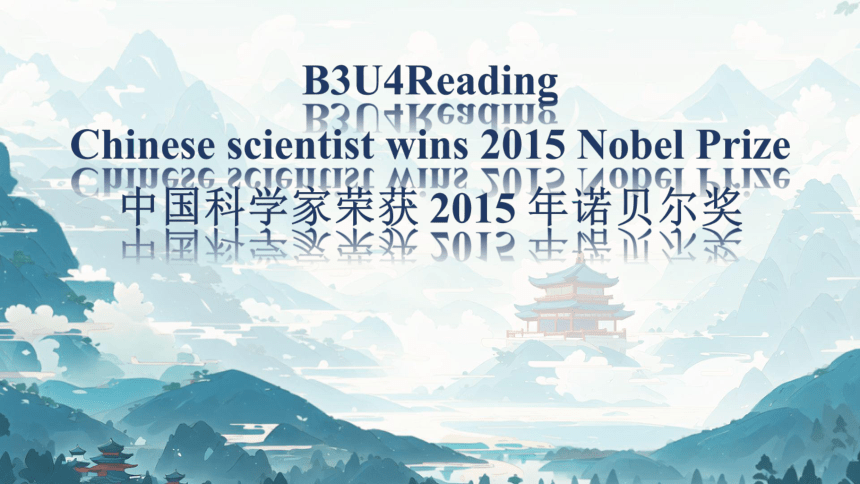
|
|
| 格式 | pptx | ||
| 文件大小 | 485.0KB | ||
| 资源类型 | 教案 | ||
| 版本资源 | 牛津译林版(2019) | ||
| 科目 | 英语 | ||
| 更新时间 | 2025-06-14 22:29:41 | ||
图片预览

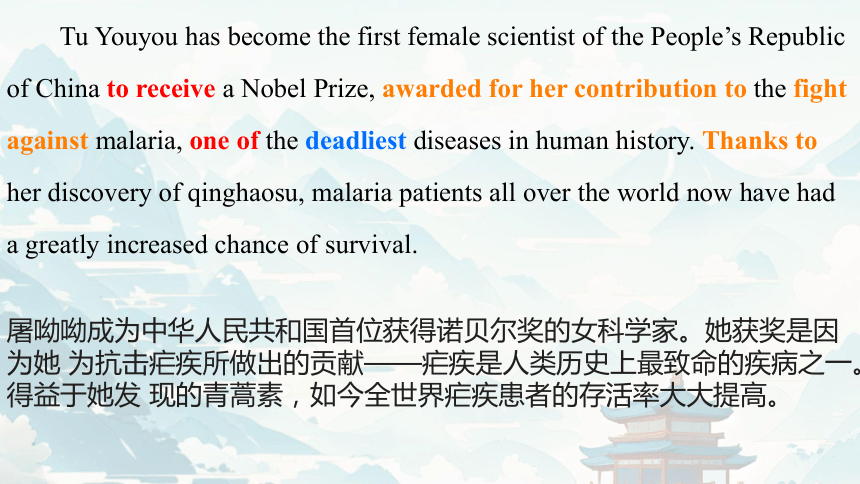
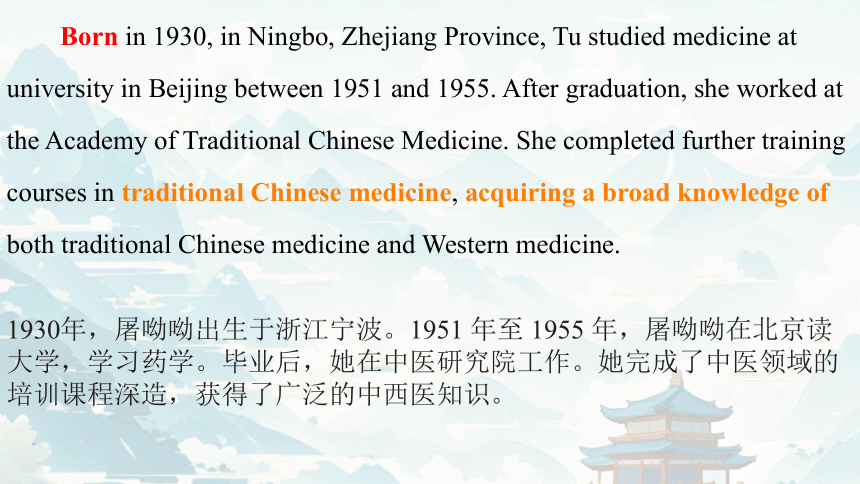
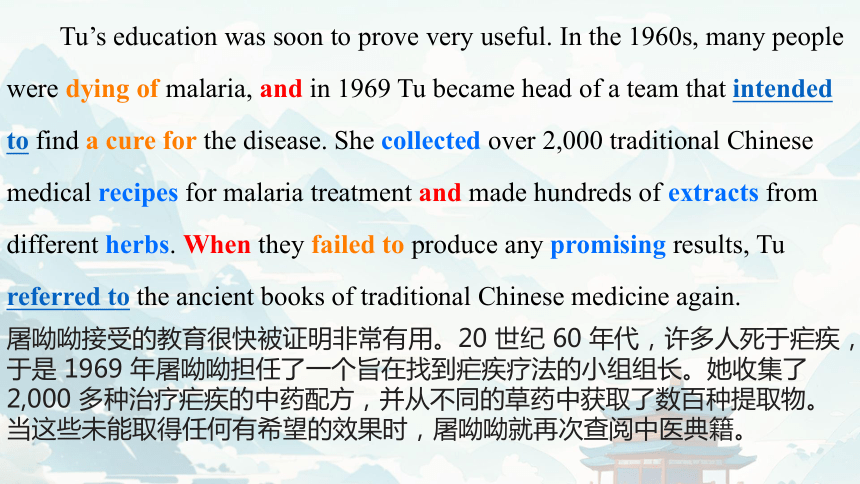
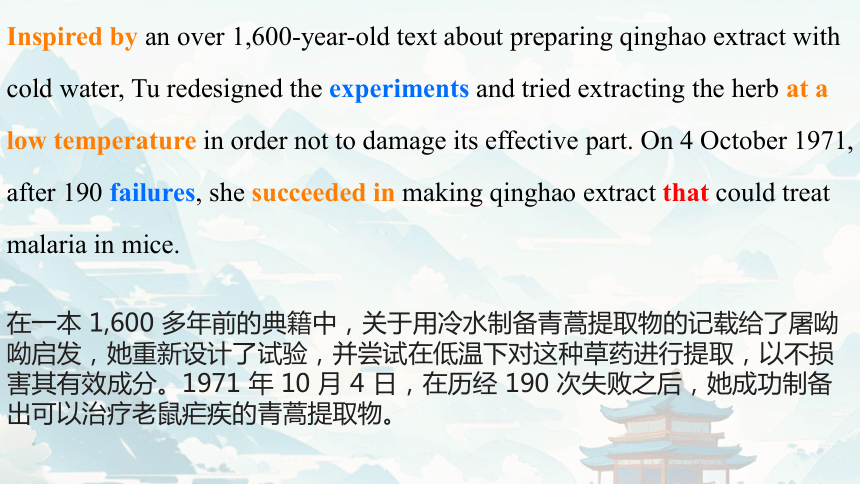
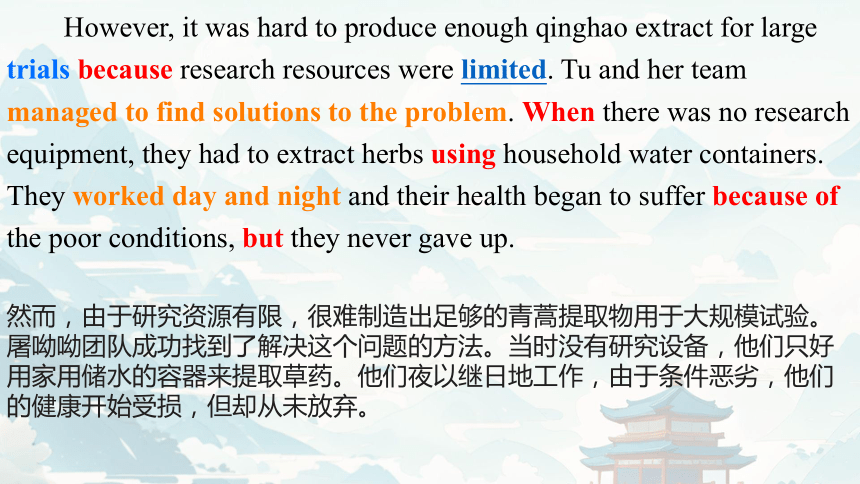
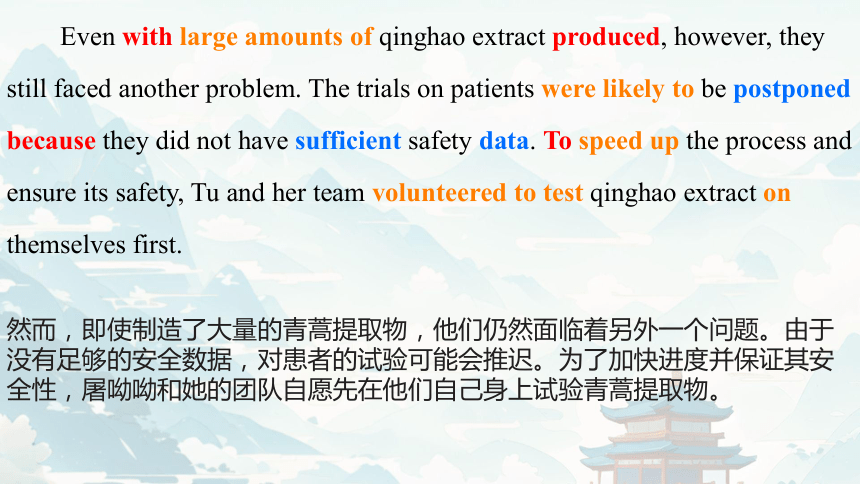
文档简介
(共17张PPT)
B3U4Reading
Chinese scientist wins 2015 Nobel Prize
中国科学家荣获 2015 年诺贝尔奖
Tu Youyou has become the first female scientist of the People’s Republic of China to receive a Nobel Prize, awarded for her contribution to the fight against malaria, one of the deadliest diseases in human history. Thanks to her discovery of qinghaosu, malaria patients all over the world now have had a greatly increased chance of survival.
屠呦呦成为中华人民共和国首位获得诺贝尔奖的女科学家。她获奖是因为她 为抗击疟疾所做出的贡献——疟疾是人类历史上最致命的疾病之一。得益于她发 现的青蒿素,如今全世界疟疾患者的存活率大大提高。
Born in 1930, in Ningbo, Zhejiang Province, Tu studied medicine at university in Beijing between 1951 and 1955. After graduation, she worked at the Academy of Traditional Chinese Medicine. She completed further training courses in traditional Chinese medicine, acquiring a broad knowledge of both traditional Chinese medicine and Western medicine.
1930年,屠呦呦出生于浙江宁波。1951 年至 1955 年,屠呦呦在北京读大学,学习药学。毕业后,她在中医研究院工作。她完成了中医领域的培训课程深造,获得了广泛的中西医知识。
Tu’s education was soon to prove very useful. In the 1960s, many people were dying of malaria, and in 1969 Tu became head of a team that intended to find a cure for the disease. She collected over 2,000 traditional Chinese medical recipes for malaria treatment and made hundreds of extracts from different herbs. When they failed to produce any promising results, Tu referred to the ancient books of traditional Chinese medicine again.
屠呦呦接受的教育很快被证明非常有用。20 世纪 60 年代,许多人死于疟疾,于是 1969 年屠呦呦担任了一个旨在找到疟疾疗法的小组组长。她收集了 2,000 多种治疗疟疾的中药配方,并从不同的草药中获取了数百种提取物。当这些未能取得任何有希望的效果时,屠呦呦就再次查阅中医典籍。
Inspired by an over 1,600-year-old text about preparing qinghao extract with cold water, Tu redesigned the experiments and tried extracting the herb at a low temperature in order not to damage its effective part. On 4 October 1971, after 190 failures, she succeeded in making qinghao extract that could treat malaria in mice.
在一本 1,600 多年前的典籍中,关于用冷水制备青蒿提取物的记载给了屠呦呦启发,她重新设计了试验,并尝试在低温下对这种草药进行提取,以不损害其有效成分。1971 年 10 月 4 日,在历经 190 次失败之后,她成功制备出可以治疗老鼠疟疾的青蒿提取物。
However, it was hard to produce enough qinghao extract for large trials because research resources were limited. Tu and her team managed to find solutions to the problem. When there was no research equipment, they had to extract herbs using household water containers. They worked day and night and their health began to suffer because of the poor conditions, but they never gave up.
然而,由于研究资源有限,很难制造出足够的青蒿提取物用于大规模试验。屠呦呦团队成功找到了解决这个问题的方法。当时没有研究设备,他们只好用家用储水的容器来提取草药。他们夜以继日地工作,由于条件恶劣,他们的健康开始受损,但却从未放弃。
Even with large amounts of qinghao extract produced, however, they still faced another problem. The trials on patients were likely to be postponed because they did not have sufficient safety data. To speed up the process and ensure its safety, Tu and her team volunteered to test qinghao extract on themselves first.
然而,即使制造了大量的青蒿提取物,他们仍然面临着另外一个问题。由于没有足够的安全数据,对患者的试验可能会推迟。为了加快进度并保证其安全性,屠呦呦和她的团队自愿先在他们自己身上试验青蒿提取物。
The efforts of Tu and her team finally paid off. In November 1972, through trial and error, they successfully discovered qinghaosu—the most effective part of the qinghao extract. As a key part of many malaria medicines, qinghaosu has since benefited about 200 million malaria patients. More than 40 years after its discovery, Tu was eventually awarded a Nobel Prize for her work.
屠呦呦团队的努力最终得到了回报。1972 年 11 月,经过反复试验,他们成功发现了青蒿素——青蒿提取物中最有效的成分。作为许多抗疟药物中的关键成分,青蒿素迄今已经造福了近 2 亿疟疾患者。在发现青蒿素 40 多年后,屠呦呦终于因此获得了诺贝尔奖。
In her Nobel Lecture, she encouraged scientists to further explore the treasure house of traditional Chinese medicine and raise it to a higher level. Perhaps the next generation of scientists, drawing on the wisdom of traditional Chinese medicine, will indeed discover more medicines beneficial to global health care.
在她的获奖演讲上,屠呦呦鼓励科学家们进一步探索中医这座宝库,并让其更上一层楼。也许新一代的科学家汲取中医的智慧,确实能发现更多有益于全世界医疗的药物。
It was not until…that… 强调句
e.g.: ①He didn’t realize his mistake until his partner pointed it out.
→Not until his partner pointed it out __________________________.
→It was ____________________________ that ___________________.
②We didn’t come back home until we got the result.
→
→
not until 直到…才… 【位于句首,句子要部分倒装】
did he realize his mistake
not until his partner pointed it out
he realized his mistake
Not until we got the result did we come back home.
It was not until we got the result that we came back home.
without引导含蓄虚拟条件句
类别 从句谓语动词 主句谓语动词
与现在事实相反 过去式(be用were) would/could/might+动原
与过去事实相反 had done would/could/might+have done
与将来事实相反 过去式(be用were) would/could/might+动原
should+动原
were to+动原
if引导虚拟条件句的用法:
e.g.: ①If the apartment had been covered with carpet, I would have had to spend a lot of time having the carpet cleaned.(课课练B3U2P54)
without引导含蓄虚拟条件句
e.g.: ①If the apartment had been covered with carpet, I would have had to spend a lot of time having the carpet cleaned.(课课练B3U2P54)
②I wish I had had a chance to talk to you last night, but you left so early.(教材B3U1P6)
③He talked about Rome as if he had been there before.
④Without your sincere and generous help, I wouldn’t have made such great progress in English.
intend (vt.& vi.)想要,计划;意指
e.g.: ①They intended ________ (go) on a honeymoon after the wedding.
②I, as well as my friends, had intended to have a trip after graduation, but we ended up finding a job first.
③The program was set up _____ the intention of helping the homeless.
④The school being built at present is said to be intended ____ the disabled children.
(1)intend to do sth 打算做某事
intend sb to do sth 打算让某人做某事
had intended to do sth 原本打算做某事
(2)intended (adj.) 打算的;为…打算/设计的;计划的
be intended to do sth 目的是… be intended for sb/sth 专门为…设计的
(3)intention (n.) 意图,目的;企图
with an/the intention of 抱有…的目的;打算…
have an/no intention of doing 有/没有做…的打算
to go
with
for
refer to 查阅,参考;提到,谈及
e.g.: ①The scientist referred to the discovery ____ the most exciting new development in this field.
②As the situation was unusual, he referred the matter ____ the editor.
③She made no _______(refer) to her illness but only to her future plans.
④如果你不理解某些单词,可以查词典。
(1)refer to…as… 把…称作…
refer…to… 把…提交给…
(2)reference (n.) 谈及;提及;参考;查阅
make reference to 提及
reference book 参考书
If you don’t understand some words, you can refer to the dictionary.
as
to
reference
limited (adj.)有限的
e.g.: ①He was born into a poor family, and only received limited education in his childhood.
②Reading satisfies my desire to keep learning. And I’ve found that the possibilities that lie within books are limitless.
③The length of the article should be limited ____ 400 words or so.
④With hard work and determination, there’s no limit to what you can achieve.
(1)limit (vt.)限制 (n.)限制;极限;界限
limit…to… 把…限制在…内
beyond the limit 超出限度
without limit 无限制地
There is a/no limit to (doing) sth …是有限的/无限的
(2)limitless (adj.) 无限的
to
pay off 取得成功;还清债务;解雇
e.g.: ①He studied hard before the examination, and it paid off.
②Over 1,000 workers will be paid off if this factory closes.
③I paid off my loan(按揭;贷款) after years of hard work.
beneficial (adj.)有益的,有用的
e.g.: ①A large number of students will benefit ________ the new teaching method.
②The new policy is ____ the benefit of all employees.
③希望我的建议能对你有益。
(1)be beneficial to 对…有益;有益于(to为介词)
(2)benefit (n.)优势;益处 (v.)使受益;得益于
be of benefit to 对……有益
for the benefit of…=for one’s benefit 为了…的利益;为了帮助某人
(3)benefit from/by… 从…中受益;得益于…
Hopefully my suggestion can be beneficial to/be of benefit to you.
from/by
for
B3U4Reading
Chinese scientist wins 2015 Nobel Prize
中国科学家荣获 2015 年诺贝尔奖
Tu Youyou has become the first female scientist of the People’s Republic of China to receive a Nobel Prize, awarded for her contribution to the fight against malaria, one of the deadliest diseases in human history. Thanks to her discovery of qinghaosu, malaria patients all over the world now have had a greatly increased chance of survival.
屠呦呦成为中华人民共和国首位获得诺贝尔奖的女科学家。她获奖是因为她 为抗击疟疾所做出的贡献——疟疾是人类历史上最致命的疾病之一。得益于她发 现的青蒿素,如今全世界疟疾患者的存活率大大提高。
Born in 1930, in Ningbo, Zhejiang Province, Tu studied medicine at university in Beijing between 1951 and 1955. After graduation, she worked at the Academy of Traditional Chinese Medicine. She completed further training courses in traditional Chinese medicine, acquiring a broad knowledge of both traditional Chinese medicine and Western medicine.
1930年,屠呦呦出生于浙江宁波。1951 年至 1955 年,屠呦呦在北京读大学,学习药学。毕业后,她在中医研究院工作。她完成了中医领域的培训课程深造,获得了广泛的中西医知识。
Tu’s education was soon to prove very useful. In the 1960s, many people were dying of malaria, and in 1969 Tu became head of a team that intended to find a cure for the disease. She collected over 2,000 traditional Chinese medical recipes for malaria treatment and made hundreds of extracts from different herbs. When they failed to produce any promising results, Tu referred to the ancient books of traditional Chinese medicine again.
屠呦呦接受的教育很快被证明非常有用。20 世纪 60 年代,许多人死于疟疾,于是 1969 年屠呦呦担任了一个旨在找到疟疾疗法的小组组长。她收集了 2,000 多种治疗疟疾的中药配方,并从不同的草药中获取了数百种提取物。当这些未能取得任何有希望的效果时,屠呦呦就再次查阅中医典籍。
Inspired by an over 1,600-year-old text about preparing qinghao extract with cold water, Tu redesigned the experiments and tried extracting the herb at a low temperature in order not to damage its effective part. On 4 October 1971, after 190 failures, she succeeded in making qinghao extract that could treat malaria in mice.
在一本 1,600 多年前的典籍中,关于用冷水制备青蒿提取物的记载给了屠呦呦启发,她重新设计了试验,并尝试在低温下对这种草药进行提取,以不损害其有效成分。1971 年 10 月 4 日,在历经 190 次失败之后,她成功制备出可以治疗老鼠疟疾的青蒿提取物。
However, it was hard to produce enough qinghao extract for large trials because research resources were limited. Tu and her team managed to find solutions to the problem. When there was no research equipment, they had to extract herbs using household water containers. They worked day and night and their health began to suffer because of the poor conditions, but they never gave up.
然而,由于研究资源有限,很难制造出足够的青蒿提取物用于大规模试验。屠呦呦团队成功找到了解决这个问题的方法。当时没有研究设备,他们只好用家用储水的容器来提取草药。他们夜以继日地工作,由于条件恶劣,他们的健康开始受损,但却从未放弃。
Even with large amounts of qinghao extract produced, however, they still faced another problem. The trials on patients were likely to be postponed because they did not have sufficient safety data. To speed up the process and ensure its safety, Tu and her team volunteered to test qinghao extract on themselves first.
然而,即使制造了大量的青蒿提取物,他们仍然面临着另外一个问题。由于没有足够的安全数据,对患者的试验可能会推迟。为了加快进度并保证其安全性,屠呦呦和她的团队自愿先在他们自己身上试验青蒿提取物。
The efforts of Tu and her team finally paid off. In November 1972, through trial and error, they successfully discovered qinghaosu—the most effective part of the qinghao extract. As a key part of many malaria medicines, qinghaosu has since benefited about 200 million malaria patients. More than 40 years after its discovery, Tu was eventually awarded a Nobel Prize for her work.
屠呦呦团队的努力最终得到了回报。1972 年 11 月,经过反复试验,他们成功发现了青蒿素——青蒿提取物中最有效的成分。作为许多抗疟药物中的关键成分,青蒿素迄今已经造福了近 2 亿疟疾患者。在发现青蒿素 40 多年后,屠呦呦终于因此获得了诺贝尔奖。
In her Nobel Lecture, she encouraged scientists to further explore the treasure house of traditional Chinese medicine and raise it to a higher level. Perhaps the next generation of scientists, drawing on the wisdom of traditional Chinese medicine, will indeed discover more medicines beneficial to global health care.
在她的获奖演讲上,屠呦呦鼓励科学家们进一步探索中医这座宝库,并让其更上一层楼。也许新一代的科学家汲取中医的智慧,确实能发现更多有益于全世界医疗的药物。
It was not until…that… 强调句
e.g.: ①He didn’t realize his mistake until his partner pointed it out.
→Not until his partner pointed it out __________________________.
→It was ____________________________ that ___________________.
②We didn’t come back home until we got the result.
→
→
not until 直到…才… 【位于句首,句子要部分倒装】
did he realize his mistake
not until his partner pointed it out
he realized his mistake
Not until we got the result did we come back home.
It was not until we got the result that we came back home.
without引导含蓄虚拟条件句
类别 从句谓语动词 主句谓语动词
与现在事实相反 过去式(be用were) would/could/might+动原
与过去事实相反 had done would/could/might+have done
与将来事实相反 过去式(be用were) would/could/might+动原
should+动原
were to+动原
if引导虚拟条件句的用法:
e.g.: ①If the apartment had been covered with carpet, I would have had to spend a lot of time having the carpet cleaned.(课课练B3U2P54)
without引导含蓄虚拟条件句
e.g.: ①If the apartment had been covered with carpet, I would have had to spend a lot of time having the carpet cleaned.(课课练B3U2P54)
②I wish I had had a chance to talk to you last night, but you left so early.(教材B3U1P6)
③He talked about Rome as if he had been there before.
④Without your sincere and generous help, I wouldn’t have made such great progress in English.
intend (vt.& vi.)想要,计划;意指
e.g.: ①They intended ________ (go) on a honeymoon after the wedding.
②I, as well as my friends, had intended to have a trip after graduation, but we ended up finding a job first.
③The program was set up _____ the intention of helping the homeless.
④The school being built at present is said to be intended ____ the disabled children.
(1)intend to do sth 打算做某事
intend sb to do sth 打算让某人做某事
had intended to do sth 原本打算做某事
(2)intended (adj.) 打算的;为…打算/设计的;计划的
be intended to do sth 目的是… be intended for sb/sth 专门为…设计的
(3)intention (n.) 意图,目的;企图
with an/the intention of 抱有…的目的;打算…
have an/no intention of doing 有/没有做…的打算
to go
with
for
refer to 查阅,参考;提到,谈及
e.g.: ①The scientist referred to the discovery ____ the most exciting new development in this field.
②As the situation was unusual, he referred the matter ____ the editor.
③She made no _______(refer) to her illness but only to her future plans.
④如果你不理解某些单词,可以查词典。
(1)refer to…as… 把…称作…
refer…to… 把…提交给…
(2)reference (n.) 谈及;提及;参考;查阅
make reference to 提及
reference book 参考书
If you don’t understand some words, you can refer to the dictionary.
as
to
reference
limited (adj.)有限的
e.g.: ①He was born into a poor family, and only received limited education in his childhood.
②Reading satisfies my desire to keep learning. And I’ve found that the possibilities that lie within books are limitless.
③The length of the article should be limited ____ 400 words or so.
④With hard work and determination, there’s no limit to what you can achieve.
(1)limit (vt.)限制 (n.)限制;极限;界限
limit…to… 把…限制在…内
beyond the limit 超出限度
without limit 无限制地
There is a/no limit to (doing) sth …是有限的/无限的
(2)limitless (adj.) 无限的
to
pay off 取得成功;还清债务;解雇
e.g.: ①He studied hard before the examination, and it paid off.
②Over 1,000 workers will be paid off if this factory closes.
③I paid off my loan(按揭;贷款) after years of hard work.
beneficial (adj.)有益的,有用的
e.g.: ①A large number of students will benefit ________ the new teaching method.
②The new policy is ____ the benefit of all employees.
③希望我的建议能对你有益。
(1)be beneficial to 对…有益;有益于(to为介词)
(2)benefit (n.)优势;益处 (v.)使受益;得益于
be of benefit to 对……有益
for the benefit of…=for one’s benefit 为了…的利益;为了帮助某人
(3)benefit from/by… 从…中受益;得益于…
Hopefully my suggestion can be beneficial to/be of benefit to you.
from/by
for
同课章节目录
- Unit 1 Nature in the balance
- Welcome to the unit
- Reading
- Grammar and usage
- Integrated skills
- Extended reading
- Project
- Unit 2 Natural disasters
- Welcome to the unit
- Reading
- Grammar and usage
- Integrated skills
- Extended reading
- Project
- Unit 3 The world online
- Welcome to the unit
- Reading
- Grammar and usage
- Integrated skills
- Extended reading
- Project
- Unit 4 Scientists who changed the world
- Welcome to the unit
- Reading
- Grammar and usage
- Integrated skills
- Extended reading
- Project
